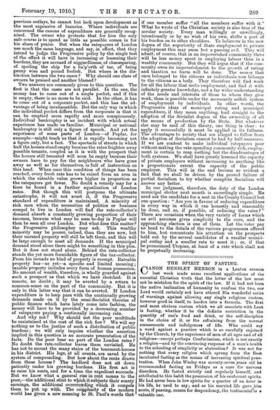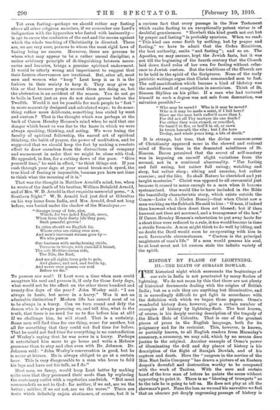THE SPIRIT OF FASTING.
CANON HENSLEY HENSON in a Lenten sermon last week made some excellent applications of the essential Christian truth that the letter of the law must not be mistaken for the spirit of the law. If it had not been the native inclination of humanity to confuse the two, our Lord would certainly not have uttered His wonderful series of warnings against allowing any single religious custom, however good in itself, to harden into a formula. The first and most obvious custom which we all associate with Lent is fasting, whether it be the definite restriction in the quantity of one's food and drink, or the self-discipline in the choice of it, or the refraining from the normal amusements and indulgences of life. Who could say a word against a practice which is so carefully enjoined by the Church, by the experience of men of all ages and of all religions—except perhaps Confucianism, which is not exactly a religion—and by the convincing response of a man's health to the schooling of simplicity or abstention ? It was not for nothing that every religion which sprang from the East inculcated fasting as the means of increasing spiritual pene- tration. When John Wesley was seventy-seven years old he recommended fasting on Fridays as a cure for nervous disorders. He fasted strictly and regularly himself, and attributed to this habit the possession of his exuberant spirits. He had never been in low spirits for a quarter of an hour in his life, he used to say; and as his married life gave ,him acute, if passing, causes for despondency, the testimonial'is a valuable one.
Yet even fasting—perhaps we should rather say fasting above all other religious exercises, if we remember our Lord's indignation with the hypocrites who fasted with insincerity— is apt to cause the confusion of the end and the means against which the whole teaching of Christianity is directed. There are, we are very sure, persons to whom the most rigid laws of fasting bring no snares. Moreover, there are persons to whom what may appear to be a rather unreal discipline, a rather arbitrary principle of distinguishing between neces- saries and luxuries, brings a genuine spiritual endowment. It would be utterly wrong and impertinent to suggest that their Lenten observances are irrational. But, after all, most men and women who " keep " Lent keep it as it is the fashion in their society to keep it. They may give up this or that because people around them are doing so, but the abstention is an accident of the season. You do not go to balls in Lent just as you do not shoot grouse before the Twelfth. Would it not be possible for such people to " fast " in more accurately designed and calculated ways ; to do some- thing rather more deliberate, something less staled by wont and custom ? That is the thought which was perhaps at the back of Canon Hensley Henson's mind when he said that one danger which beset us was due to the haste in which we were always speaking, thinking, and acting. We were losing the faculty of spiritual fellowship, the sacred art of spiritual thinking, the habit of prayer, the power of meditation, and be suggested that we should keep the fast by making a resolute effort to draw ourselves from the distractions of company and amusement in order that we might be alone with God. He appealed, in fine, for a cutting down of the pace. " Give yourself time," he said in effect, " to think things out. If you rash through your days at your usual break-neck speed, the true kind of fasting is impossible, because you have not time to think what the meaning of it is."
That was the thought in Matthew Arnold's mind, too, when be wrote of the death of his brother, William Delafield Arnold, and of Mrs. W. D. Arnold in that exquisite memorial poem, " A Southern Night." W. D. Arnold bad just died at Gibraltar on his way home from India, and Mrs. Arnold, dead not long before, was buried under the shadow of the Himalayas r-
" Strange irony of fate, alas,
Which, for two jaded English, Eaves, When from their dusty life they pass, Such peaceful graves !
In cities should we English lie,
Where cries are rising ever new, And men's incessant stream goes by—
We who pursue Our business with unslackening stride, Traverse in troops, with care-fill'd breast, The soft Mediterranean side, The Nile, the East, And see all sights from pole to pole, And glance, and nod, and bustle by, And never once possess our soul Before we die.'
To possess our soul ! If Lent were a time when man could recapture his soul and possess it, if only for those forty days, what would not be the effect on the other three hundred and twenty-five days of the year ? John Wesley said: "I am always in haste, but never in a hurry." Was it not an admirable distinction P Modern life has caused most of us to be always in a hurry. Can we turn round and defy the demon who is always pursuing us, and tell him, what is the truth, that there is no need for us to flee before him at all? If we challenge him, he will stand. That is a certainty. Some men will find time for one thing, some for another, but all for something that they could not find time for before.
That he could not find time for everything is no contradiction of Wesley's saying that he was never in a hurry. Perhaps
it entertained him more to go home and write a Hebrew grammar than to stay and chat even with Dr. Johnson. Dr. Johnson said : "John Wesley's conversation is good, but he is never at leisure. He is always obliged to go at a certain hour. This is very disagreeable to a man who loves to fold his legs and have out his talk, as I do."
Most men, we fancy, would keep Lent better by making quite sure that they possessed their souls than by replacing the customary cutlet with a vegetarian sandwich., "But meat commendeth us not to God : for neither, if we eat, are we the
better ; neither, if we eat not, are we the worse." There are texts which definitely enjoin abstinence, of course, but if is
a curious fact that every passage in the New Testament
which exalts fasting to an exceptionally potent virtue is of doubtful genuineness. " Howbeit this kind goeth not out but by prayer and fasting" is probably spurious. When we read: " This kind can come forth by nothing, but by prayer and fasting," we have to admit that the Codex Sinaiticns, the best authority, omits "and fasting"; and so on. The Apostles, we may assume, kept the Jewish fasts, but it was not till the beginning of the fourth century that the Church laid down fixed rules of her own for fasting without refer- ence to Jewish custom. But the traditions of the Church are to be held in the spirit of the Scriptures. None of the early patristic writings argue that Christ commanded men to fast.
The self-mortification which became a kind of idolatry was the morbid result of competition in asceticism. Think of St. Simeon Stylites on his pillar. If a man who had tortured himself to such a degree was not safe from damnation, was salvation possible?- " Who may be saved ? Who is it may be saved? Who is it may bo made a saint, if I fail here ? Show me the man bath suffer'd more than I. For did not all Thy martyrs die one death ? For either they were stoned, or crucified, Or burn'd in fire, or boil'd in oil, or sawn In twain beneath the ribs ; but I die here To-day, and whole years long, a life of death?'
It is strange, but true, that the divine common-sense of Christianity appeared more in the shrewd and rational
mind of Bacon than in the demented saintliness of St. Simeon. Bacon perceived that the secret of self-mastery was in imposing on oneself slight variations from the normal, not in a continual abnormality. " Use fasting
and full eating, but rather full eating; watching and sleep, but rather sleep ; sitting and exercise, but rather exercise; and the like. So shall Nature be cherished and yet taught masteries." Christ was opposed to all ceremonial just because it ceased to mean enough to a man when it became systematised. One would like to have included in the Bible the beautifully characteristic story, which exists outside the
Canon—Luke vi. 5 [Codex Bezae]—that when Christ saw a man working on the Sabbath He said to him : " 0 man, if indeed thou knowest what thou doest thou art blessed; but if thou knowest not thou art accursed, and a transgressor of the law." If Canon Hensley Henson's exhortation to pat away haste for a short time were reduced to a-rule, it too would become in time a sterile formula. A man might think to do well by idling, and no doubt the Devil would soon be co-operating with him in such favourable circumstances. " Custom is the principal magistrate of man's life." If a man would possess his soul, he at least must not let custom stale the infinite variety of the spirit.









































 Previous page
Previous page